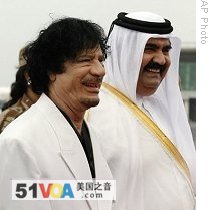Addis Ababa
29 March 2009
Libyan leader Muammar Gadhafi is challenging the authority of African Union Peace and Security Council to sanction member states where an elected government has been ousted in a coup d'etat. Mr. Gadhafi visited AU headquarters in Addis Ababa after the Pan-African security body contradicted him on the status of the recent military coup in Mauritania.
Mr. Gadhafi, who holds the rotating African Union chairmanship, called the entire AU Commission into session Late Saturday and early Sunday. He kept them waiting for hours for his arrival, in an apparent sign of displeasure at the Peace and Security Council's decision to maintain a travel ban and asset freeze on the leaders of Mauritania's military coup.
The Council's action came days after Mr. Gadhafi met coup leaders in Nouakchott and announced he would have the sanctions removed.
The Libyan leader, who came to power in a military coup 40 years ago, told reporters the African Union should accept the Mauritanian coup and help its leaders organize fresh elections.
"In the end it is an internal affair that is the concern of the Mauritanian people," said Gadhafi. "It is a fait accompli, a reality. We have to accept it. We cannot change it. That change, that is the business of the Mauritanians if they want to change a fait accompli."
Mr. Gadhafi did not meet with the 15-member Peace and Security Council. He said the Council does not have independent authority to impose sanctions.
"Sanctions cannot be implemented unless they are agreed and approved by the assembly, by the summit," he said. "The Peace and Security Council, even if they decide to have sanctions, cannot be implemented unless it is endorsed by the summit."
Diplomats and AU sources privately dispute Mr. Gadhafi's interpretation. Article seven of the Council's Protocol states it "shall institute sanctions whenever an unconstitutional change of government takes place".
Diplomats also noted the recent AU summit had condemned coups in Mauritania and Guinea, and an attempted coup in Guinea Bissau.
Peace and Security Commissioner Ramtane Lamamra said the question of differing interpretations will be left to lawyers to decide.
"There are some questions to be asked to the legal adviser, I think. It is much better," said Ramtane Lamamra.
 |
| Libyan leader Moammar Gadhafi, left, is accompanied by Qatari Emir Sheik Hamad Bin Khalifa Al Thani upon his arrival at Doha airport, Qatar, 29 Mar 2009 |
Gadhafi warmly welcomed the Sudanese leader in the Libyan capital days earlier. Speaking to reporters Sunday, he accused wealthy countries of using the ICC as an instrument of terrorism aimed at re-colonizing Africa.
"It is a known fact that all third world countries are opposing what is the so-called International Criminal Tribunal," he said. "Now it is a court against the countries that were colonized in the past and they want to recolonize now. It is a practice of the new world terrorists."
Libya Minister for African Union Affairs Ali Triki predicted more than 30 African members of the ICC would withdraw unless the Bashir indictments are postponed.
AU Commission Chairperson Jean Ping is expected to lead a high-level joint AU/ Arab League delegation to New York soon to appeal to the U.N. Security Council to suspend the indictments for a year.